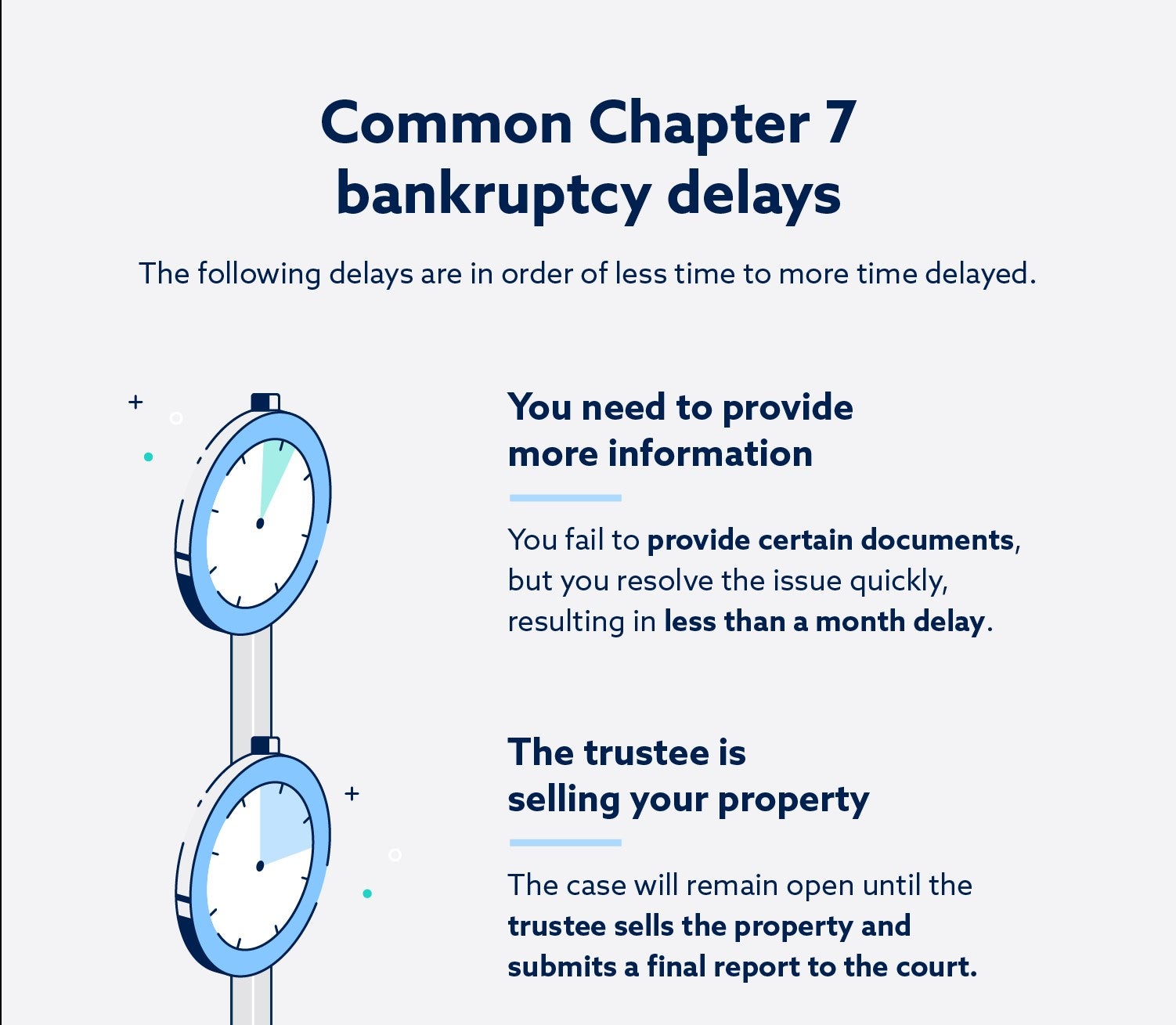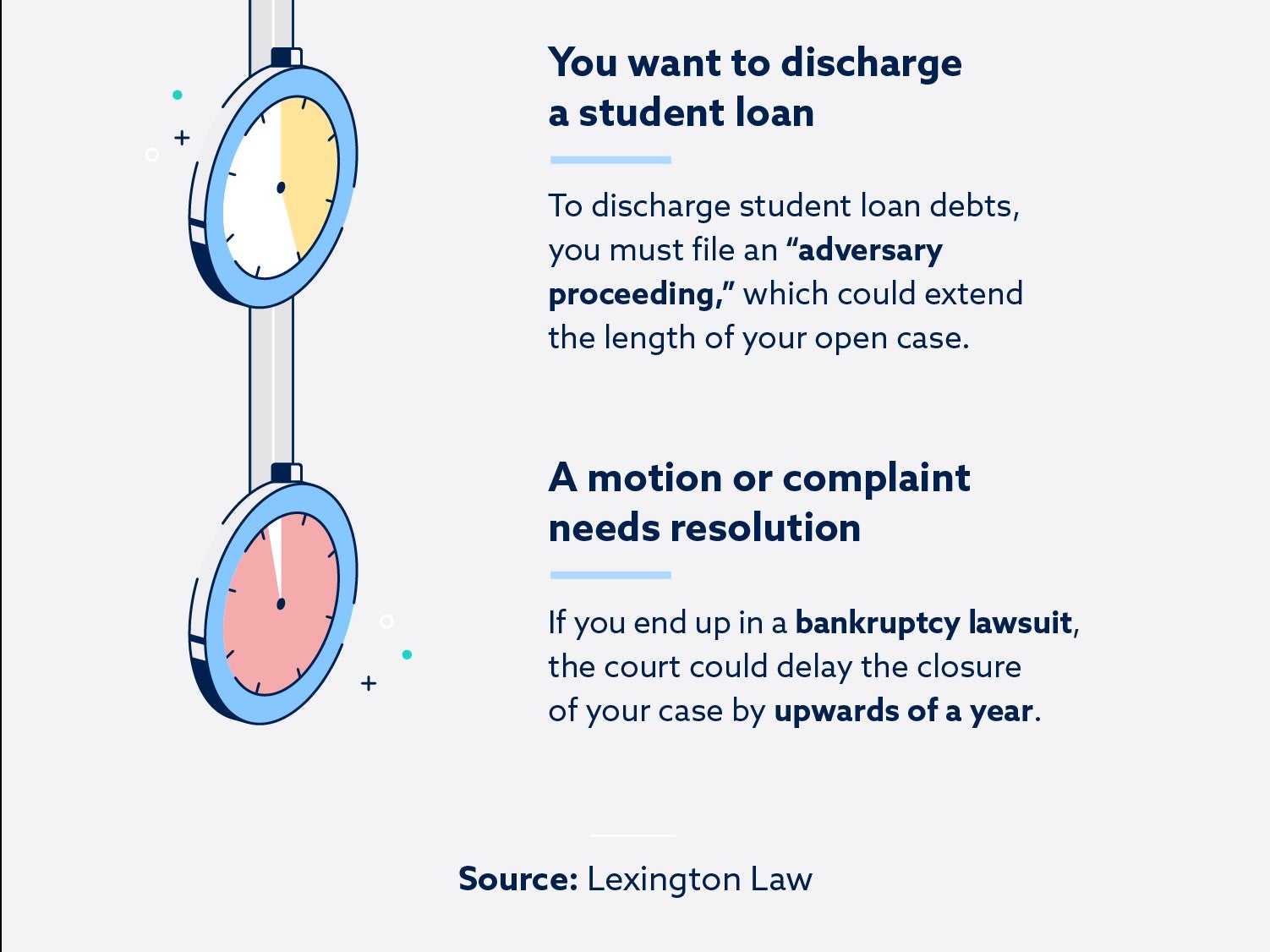
The information provided on this website does not, and is not intended to, act as legal, financial or credit advice. See Lexington Law’s editorial disclosure for more information.
The Chapter 7 bankruptcy process typically takes between four to five months from the time you file to when you receive a final discharge.
Chapter 7 bankruptcy, also known as “liquidation” or “fresh start bankruptcy,” is a common filing for people who can’t make regular payments toward their debt. This type of bankruptcy typically requires nonexempt belongings and property to be liquidated and repaid to creditors—all remaining dischargeable debt is then discharged after completing the bankruptcy process.
Due to the financial stress that comes with filing bankruptcy, it’s fair to wonder how long the process takes and how timelines differ by bankruptcy type.
Here we’ll explain the steps involved in Chapter 7 bankruptcy, typical filing times for the most common types of bankruptcies and scenarios in which a case might take longer.
The Chapter 7 bankruptcy process and timeline
The Chapter 7 bankruptcy process helps restructure your debts and overall financial situation. However, it can become quite overwhelming, so you should stay organized and consider speaking to a bankruptcy professional. Here are seven steps to take when filing a bankruptcy.

Step 1: Consult a bankruptcy professional
If you are considering filing or already filing for Chapter 7 bankruptcy, you should consult a bankruptcy professional. During your initial consultation, your bankruptcy lawyer will analyze your financial situation and recommend which course of action to take.
Step 2: Take a credit counseling course
Before you file for bankruptcy, you must take a credit counseling course. You can complete the course individually or as a group—most are available online too. The course will provide you with tools and resources to help you avoid a similar situation down the line.
Step 3: File for bankruptcy
Your attorney will reach out to the court as soon as possible to initiate the bankruptcy process. When this process begins, letters will go out to creditors to stop collection calls and any federal wage garnishments.
Step 4: Organize your debts
Be open and honest with your lawyers as you organize all your debts. Categorize your debts by secured and unsecured to ensure you are disclosing all financial information. This will make the bankruptcy process easier when the courts conduct their thorough investigation.
Step 5: Meet with your trustee
You will receive a court date to meet with a trustee. During this meeting, you will accurately present all information as they question your assets and financial case. Your 341 meeting of creditors will be roughly a month after your petition date. While you wait for your meeting date, you can get your debtor education course out of the way.
Step 6: Take the debtor education course
Before your Chapter 7 bankruptcy is complete, you will need to participate in a debtor education class—you will learn additional skills to help boost your financial management skills to lower your chances of another bankruptcy down the road.
Step 7: Await discharge review
The 341 meeting will determine the next round of deadlines for the remainder of your case. Thirty days post-341 meeting, the trustee has the option to object to the exemption you requested—creditors will have 60 days to object to the discharges. You will then receive a 45-day deadline to deal with your secured debts, including your mortgage and/or car payments.
Step 8: Receive your discharge from the judge
After the deadlines have passed and the court has received all essential documents (including completion of the debtor course), the judge will issue the formal discharge to close the case. Your official order be sent via mail afterward.
Why your Chapter 7 bankruptcy is taking so long


While most Chapter 7 bankruptcy cases discharge within five months, sometimes things don’t go according to plan. Here are a few reasons why you might experience delays.
- Your trustee requests more information: When you have to provide more information or additional supporting documentation, your case will be delayed until you supply these items. This event will push back all your deadlines, and the bankruptcy court will reschedule your 341 meeting of creditors.
- Creditors have unanswered questions: If your questions don’t receive answers during your hearing, then the trustee could reschedule—continued court meetings occur in more complex situations (including fraud). Your bankruptcy case will stay open until the initial meeting concludes, and even longer in the instance the creditors object to the discharge of debt.
- The trustee is selling your property: When the trustee has to sell your property, then your Chapter 7 bankruptcy case will remain open until you report the final documentation of proof to the court. Real estate tends to take the longest to sell vs. all other assets.
- Motions that need to be resolved: In some situations, a bankruptcy judge may need to resolve certain issues that could delay your case. An example would be if your creditor objects to your bankruptcy or if there are complaints against you—these lawsuits could add months on top of your bankruptcy case.
- You want to discharge a student loan: Student loan debt doesn’t wipe out automatically—instead, you need to file a specific bankruptcy lawsuit known as an “adversary proceeding.” These cases are for folks who can’t repay the debt due to hardship. Your bankruptcy case will stay open until you resolve your student loan matters.
Bankruptcy FAQ
How quickly can you declare bankruptcy?
After you file your case, it could take up to five months to declare bankruptcy. Your bankruptcy discharge could take roughly two months after your 341 meeting of creditors. However, some cases could take shorter or longer depending on the circumstances.
Does bankruptcy give you a fresh start?
Debtors who sell their assets and/or get their debt discharged may experience a fresh start. However, bankruptcy can be difficult to recover from, and you will likely need to work on rebuilding your credit after declaring bankruptcy. You should consider the pros and the cons of bankruptcy for your specific situation.
How fast is Chapter 7 bankruptcy discharged?
Chapter 7 bankruptcy is typically discharged within five months, but more complex cases require additional time.
How fast is Chapter 13 bankruptcy discharged?
Unlike Chapter 7 timelines, Chapter 13 bankruptcy will take several years to complete due to payments you’ll make toward your debts.
Repairing credit after a bankruptcy
Now that you are more familiar with how long it takes to file bankruptcy, it’s time to start working to repair your credit to create a solid foundation for your future. At Lexington Law, we have credit repair professionals who are here to help you every step of the way. Contact us today to learn more about how we can help you work to improve your financial situation.
Note: Articles have only been reviewed by the indicated attorney, not written by them. The information provided on this website does not, and is not intended to, act as legal, financial or credit advice; instead, it is for general informational purposes only. Use of, and access to, this website or any of the links or resources contained within the site do not create an attorney-client or fiduciary relationship between the reader, user, or browser and website owner, authors, reviewers, contributors, contributing firms, or their respective agents or employers.
